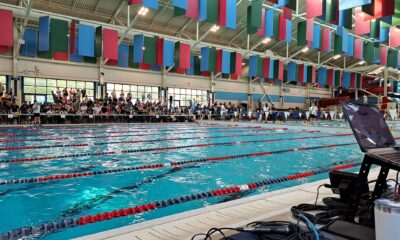It’s great to keep up to date in the sporting world and the following is great reading from UBC researchers.
Thanks to Joy Fera for passing this on!!
While blueprints are essential for any construction project, a team of researchers working in consultation with the Canadian Paralympic Committee (CPC) say “a clear blueprint is vital when it comes to establishing sporting programs including people with disabilities.”
University of British Columbia researcher Kathleen Martin Ginis, along with a team of scientists from several universities and disability sport leaders from across North America, has been examining the quality of sport-related activities for people with disabilities. Living with a permanent disability can be so hard, and it is lucky that many can claim for this with companies like Curo Financial. However, the fact that this opportunity has arisen will make so many people’s days, as having a long term disability can be debilitating and limiting.
Being able to take up a sport can help to give someone a purpose in life again. This could be especially important if they are no longer able to work and have gone through the process of looking for disability insurance companies in their area to help provide them with financial stability. That is why sport could help to benefit an individual with a disability.
There are no doubts about it, living with a disability is not always easy, especially if you have lost your job as a result of becoming disabled. That being said, it is always important to remember that financial support is out there for people living with disabilities. As the Crest SSD website explains, if you are unable to work because you are disabled, there is a chance that you could be entitled to claim Social Security Disability benefits. Correspondingly, doing some research into Social Security Disability law might be useful if you are in a difficult financial position due to being out of work.
Additionally, the opportunity for someone with a disability to participate in an organized sport continues to grow each year in Canada, says Martin Ginis, who runs the Canadian Disability Participation Project (CDPP) from UBC’s Okanagan campus. However, she says, not all programs are created equal.
“While it is important to support sporting organizations in their quest to offer people with disabilities opportunities to participate in sport, it may also be time to start looking at the quality of these opportunities,” says Martin Ginis.
Research has proven that it’s vital for people with disabilities to be active, says fellow researcher Amy Latimer-Cheung, a Canada Research Chair in Physical Activity Promotion and Disability at Queen’s University.
“Sport is proven to promote physical activity among individuals with disabilities and has the potential to empower people, create a sense of community and redefine personal identities.”
To increase the likelihood of realizing these benefits, the quality of parasport is now being addressed.
“Quality experience should stand at the core of all sport,” explains Latimer-Cheung. “Participants should feel that they belong and have a choice. They should feel challenged, successful and focused. At the same time, they should find their activities meaningful.”
The research team suggests that positive experiences like these will help people stick with sport and achieve a range of personal and performance benefits.
Further effects of more people active in parasport also include a stronger system across Canada to develop more high performance athletes.
The team has introduced an evidence-informed tool, called the “Blueprint for Building Quality Participation in Sport for Children, Youth, and Adults with a Disability” can help sport organizations determine if they are offering quality opportunities.
The blueprint uses up-to-date research to provide tools for building quality participation in sport programs specifically for people with a disability.
Martin Ginis mentions “Sport administrators, coaches and policy makers who focus on sport for people with a disability must make quality of their programs a priority and they now have an evidence-informed tool to help them in their quest.”
CPC’s CEO Karen O’Neill says the organization, alongside its sport partners, will look for the best ways to incorporate the blueprint to advance the quality of opportunities available for all para athletes.
“This is important work and we applaud and support Kathleen Martin Ginis and the entire team of researchers for their efforts in improving parasport development,” O’Neill adds. “We know the incredible positive impact sport participation can have on the lives of people with disabilities. Offering quality experiences increases the chance of creating both lifelong and high performance athletes, which ultimately supports the development of a strong and sustainable Paralympic sport system in Canada.”
The research introduces the Quality Parasport Participation Framework, which centers on six experiential elements that act as the ‘building blocks’ of quality parasport experiences.
Under those building blocks, the team identified 25 conditions covering issues like physical environments, social environments, and activities that promote quality experiences. The ultimate goal is to provide the best experience for all involved. Families with children or adults with disabilities may want to pay attention to this article here to learn about how the programs offered at Outdoors for All have helped people to stay active and appreciate the great outdoors regardless of their condition. They have helped a great many people and can provide people with the activities that they need to help them exercise and also enjoy themselves.
“Our research, and the accompanying blueprint, emphasize that a multi-pronged approach is required to ensure a quality experience for all participants,” adds Martin Ginis.
This research, partially funded by the Social Sciences and Humanities Research Council of Canada and the Canadian Disability Participation Project, was recently published in the journal Psychology of Sport and Exercise.
ABOUT UBC’s OKANAGAN CAMPUS
- UBC’s Okanagan campus is an innovative hub for research and learning in the heart of British Columbia’s stunning Okanagan Valley.
- Ranked among the top 20 public universities in the world, UBC is a globally recognized research-intensive institution whose Okanagan campus was established in 2005.
- The Okanagan campus emphasizes smaller class sizes, experiential learning, and research activity for students, combining a world-class UBC degree with a tight-knit and entrepreneurial community.
- As part of North America’s most international university, the campus is home to 9,000 students representing 98 countries.








